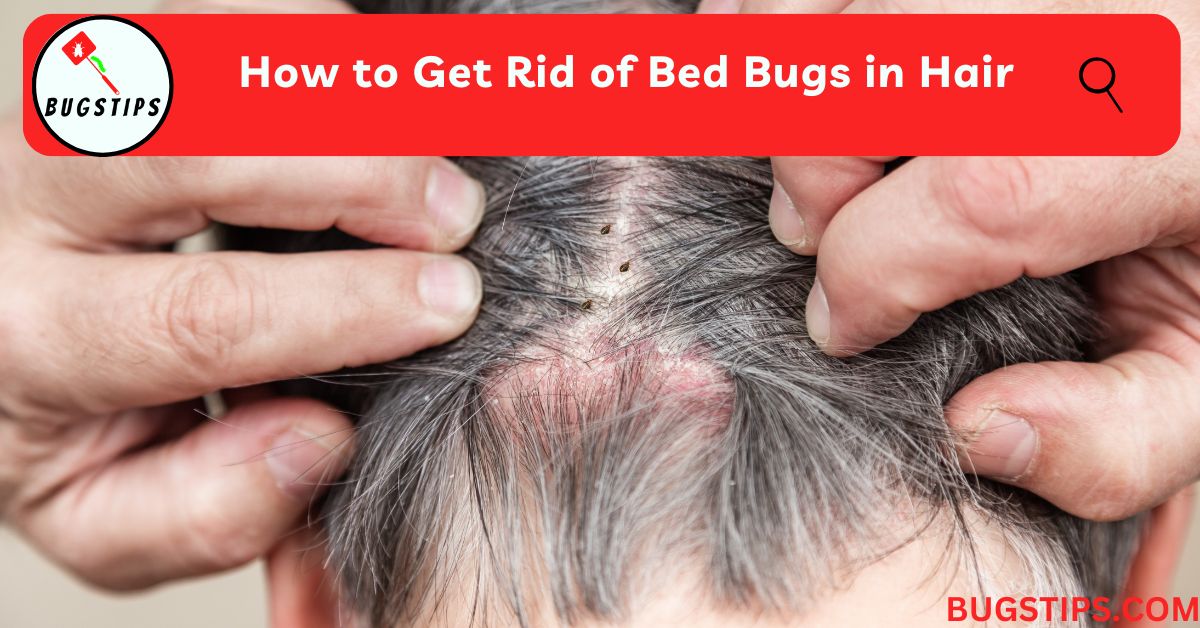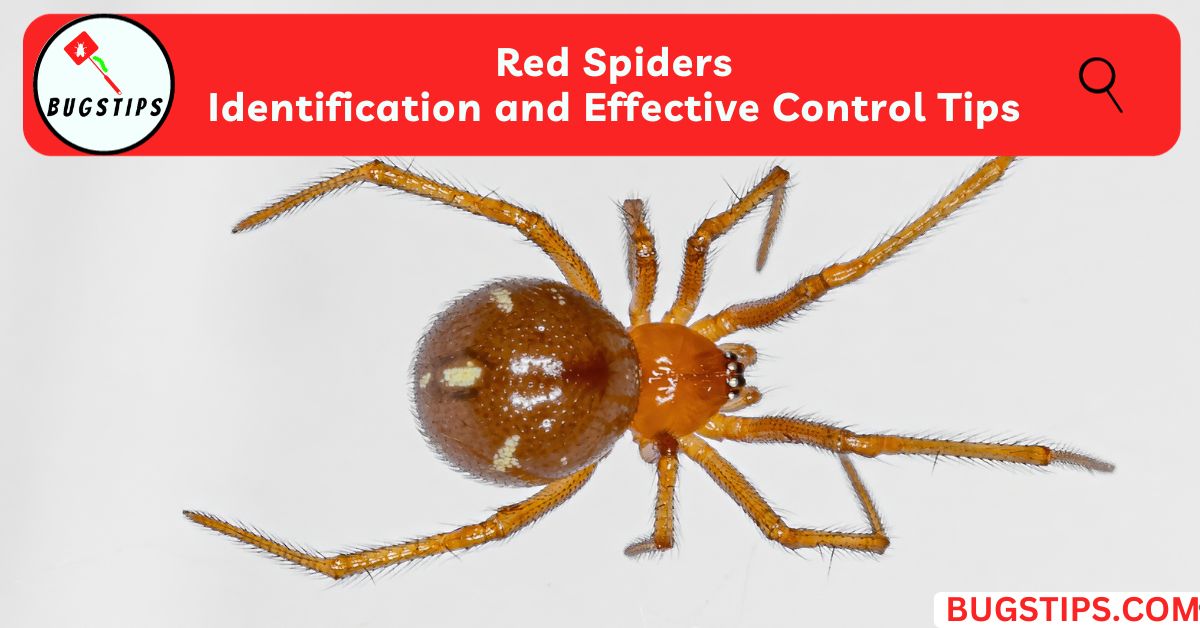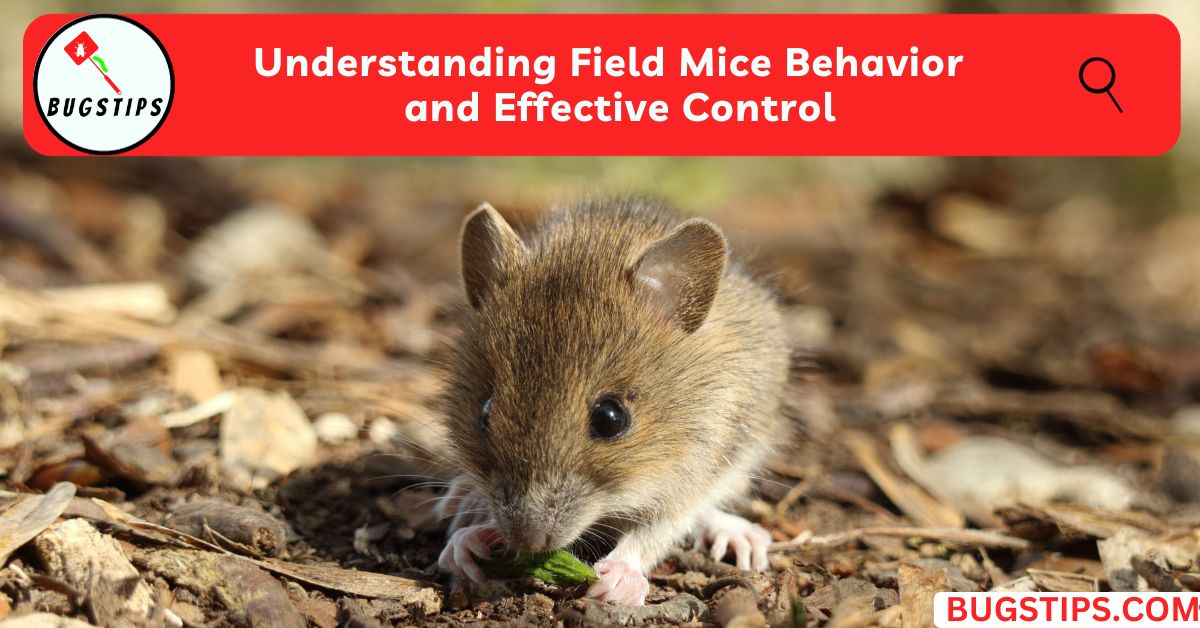This post may contain affiliate links which means as an Amazon Associate, this site may earn a small commission on qualified purchases made through links at no extra cost to you. Learn more on Affiliate Disclosure
Ants are a common household pest that can invade your dishwasher, causing frustration and concern. Whether you have noticed a few ants crawling in and out of your dishwasher or have seen a full-blown ant infestation, it’s important to take action to get rid of them.
In this article, we will discuss how to identify ants in your dishwasher, why they enter it, and most importantly, how to get rid of them. We will also cover different types of ants commonly found in dishwashers and provide tips on how to prevent future infestations.
So, if you’re dealing with ants in dishwasher, keep reading to learn how to tackle this pesky problem!
How Do I Know If I Have Ants in My Dishwasher?
Before you try to get rid of ants in your dishwasher, it’s important to identify whether or not you have an infestation. Here are some signs to look for.
- Visible Ant Trails
- Keep an eye out for ant trails near your dishwasher.
- These trails are often formed by ants marching back and forth between their nest and the dishwasher, indicating their regular visits.
- Ant Activity during Dishwasher Cycles
- Notice any unusual ant activity while your dishwasher is running? If ants emerge from the dishwasher during its cycles, it’s a strong indication that they have established a presence inside.
- Sudden Appearance of Ants
- Have you noticed a sudden increase in ant sightings when you open your dishwasher door? If ants swiftly emerge from the dishwasher as soon as it’s opened, it’s a clear sign that they have taken up residence inside.
- Stray Ants in the Kitchen
- Keep an eye out for stray ants in your kitchen area, as their presence may indicate an infestation in your dishwasher.
- If you spot ants near the dishwasher or crawling on nearby surfaces, it’s crucial to investigate further.
If you have noticed any of these signs, it's likely that you have ants in your dishwasher. The next step is to identify why they are entering it.
Related Article – Defeating Ants in Ceiling | The Ultimate Guide
Why Are There Ants in My Dishwasher?
You might be wondering why ants are drawn to your dishwasher in the first place. After all, it’s not like you’ve invited them to your kitchen party! Well, there are a few reasons why ants find your dishwasher irresistible.

- Food Residue
- Your dishwasher is a treasure trove of food residue, especially if you don’t pre-rinse your dishes before loading them.
- Even the tiniest specks of leftover food can be a feast for ants.
- They have an incredible sense of smell and can detect these enticing aromas from afar, leading them straight to your dishwasher.
- Moisture
- Ants are not just food enthusiasts; they also love moisture.
- Your dishwasher creates a warm and humid environment during its cycles, which attracts ants seeking hydration.
- The combination of food remnants and moisture makes your dishwasher a prime destination for these resourceful insects.
- Scent Trails
- Ants are social insects that communicate through chemical signals.
- When an ant discovers a food source, it leaves behind a scented trail for its fellow colony members to follow.
- If ants have previously found their way to your dishwasher, they leave behind these scent trails, leading more ants to join the party.
- Nesting Opportunities
- Some ants, such as carpenter ants, seek nesting sites near sources of food and moisture.
- If your kitchen provides favorable conditions, they may establish their nests nearby and explore your dishwasher as a potential food source.
Once ants find their way into your dishwasher, they can leave a trail for other ants to follow, leading to a potential infestation.
How Do Ants Enter the Dishwasher?
Ants are remarkably adept at locating food sources, and they can exploit even the tiniest openings to gain access to your dishwasher.
Here are some common ways ants enter your dishwasher.
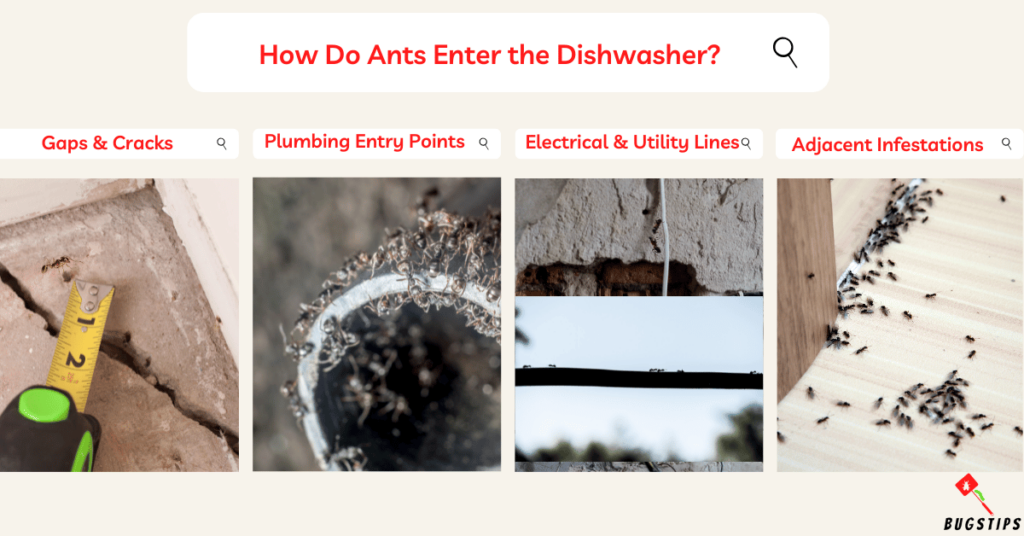
- Gaps and Cracks
- Ants can squeeze through the smallest gaps and cracks around your dishwasher.
- Check for any openings in the walls, floor, or cabinets near the dishwasher.
- Even minor gaps in seals or damaged caulking can provide entry points for these persistent pests.
- Plumbing Entry Points
- Ants can exploit plumbing entry points to infiltrate your dishwasher.
- Pipes, drains, or even tiny gaps around plumbing fixtures provide avenues for ants to enter your kitchen and find their way to the dishwasher.
- Electrical and Utility Lines
- Ants are resourceful climbers and can follow electrical wires or utility lines to access your dishwasher.
- Look for any openings or gaps where these lines enter your kitchen walls or cabinets.
- Adjacent Infestations
- Sometimes, ants establish colonies in nearby areas, such as walls, floors, or cabinets close to the dishwasher.
- From there, they can easily navigate their way into the dishwasher, drawn by the scent of food and moisture.
How to Get Rid of Ants in the Dishwasher
Dealing with ants in your dishwasher can be a frustrating and time-consuming task. However, with a systematic approach, you can effectively eliminate them and prevent future infestations.
Here are the steps you can take to get rid of ants in your dishwasher.
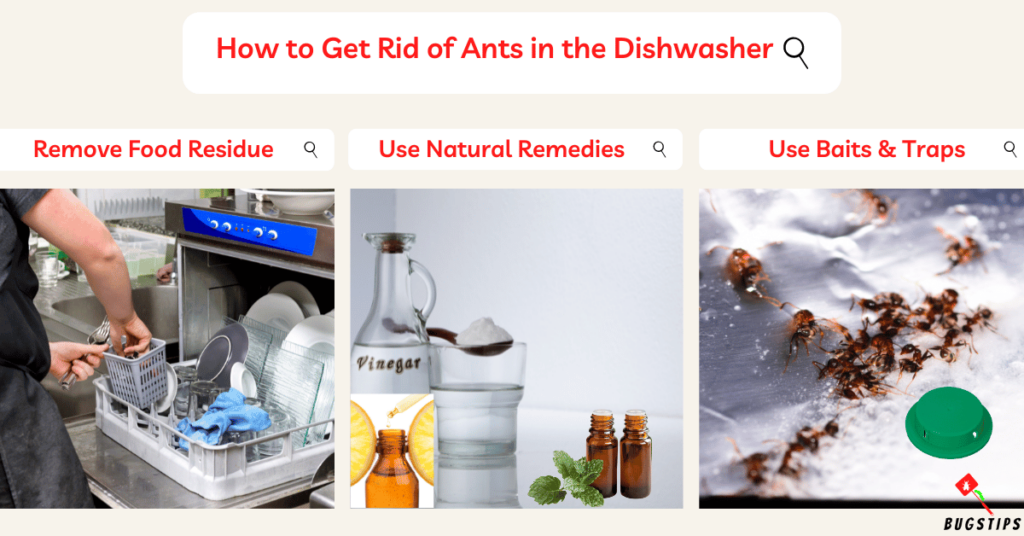
Identify the Ant Trails
Before taking any action, it’s important to identify the ant trails in and around your dishwasher. Ant trails are the paths ants follow to and from their food sources.
By tracing these trails, you can pinpoint their entry points and focus your efforts on the areas where ants are most active.
Clean and Remove Food Residue
Thoroughly cleaning your dishwasher and removing food residue is essential to eliminate the ant attractants. Follow these steps.
- Empty the dishwasher
- Remove all dishes and utensils from the dishwasher to have clear access for cleaning.
- Scrape off food remnants
- Use a spatula or brush to remove any visible food particles or debris from the dishwasher racks, filters, and walls.
- Wipe down surfaces
- Dampen a cloth with warm water and mild dish soap, then wipe down the interior surfaces of the dishwasher, including the door, sides, and bottom.
- Pay extra attention to crevices and corners where food residue may accumulate.
Natural Remedies
Natural remedies can be effective in repelling ants from your dishwasher without the use of harsh chemicals. Here are a few remedies you can try.
- White vinegar
- Fill a bowl or cup with white vinegar and place it on the top rack of your dishwasher. Run an empty cycle with hot water and vinegar.
- The vinegar’s strong odor repels ants and helps eliminate any lingering odors that may attract them.
- Peppermint Oil
- Soak cotton balls in peppermint oil and place them strategically near the dishwasher, focusing on areas where ants are commonly seen.
- The strong scent of peppermint acts as a deterrent, keeping ants at bay.
- You can also use peppermint oil natural sprays that are available on the market for easy use.
- Lemon Juice
- Squeeze fresh lemon juice onto a sponge or cloth and wipe down the interior of your dishwasher.
- The citrusy scent acts as a natural ant repellent while leaving behind a refreshing aroma.
Baiting and Trapping Methods
Baiting and trapping methods can be effective in targeting and eliminating ants within your dishwasher. Consider these options.
- Ant bait stations
- Place ant bait stations near the dishwasher, following the package instructions.
- Ants will be attracted to the bait and carry it back to their colony, effectively eliminating the entire ant population.
- DIY ant bait
- Create your own ant bait by mixing a small amount of sugar or honey with boric acid.
- Place small portions of this mixture on disposable lids near the dishwasher.
- The ants will be attracted to the sweet bait but will unknowingly carry the boric acid back to their colony, eradicating the infestation.
Related Article- How to Keep Ants Away from Sugar Jar
Vinegar-Baking Soda Combo
Here’s a bonus method you can try: the Vinegar-Baking Soda Combo. This powerful combination is not only great for cleaning and deodorizing your dishwasher but also helps to tackle stubborn buildup and residue.
Here’s how you can use this method.
- Sprinkle Baking Soda
- Start by sprinkling a generous amount of baking soda on the floor of your empty dishwasher.
- Make sure to cover the entire surface with a thin layer of baking soda.
- Spray with Vinegar
- Grab a spray bottle filled with vinegar and evenly spray it over the baking soda. As the vinegar comes into contact with the baking soda, it will cause a chemical reaction resulting in a foaming action.
- This reaction helps to loosen and remove grime and residue from the dishwasher surfaces.
- Let it Sit
- Allow the vinegar and baking soda mixture to sit in the dishwasher for about 15-20 minutes.
- This dwell time allows the foaming action to work on breaking down any stubborn buildup and neutralizing any unpleasant odors.
- Scrub if Needed
- For any areas with stubborn stains or residue, you can use a soft-bristled brush or sponge to gently scrub the surfaces.
- Focus on corners, crevices, and any visible grime that may be present.
- Rinse and Run
- After the allotted time, rinse the dishwasher thoroughly by running a regular hot water cycle.
- This will help to flush out the loosened residue and ensure that your dishwasher is clean and ready for use.
The vinegar-baking soda combo is a natural and effective method to keep your dishwasher clean and odor-free. However, it may not specifically target ants or other pests that have infested your dishwasher.
For ant infestations, it's recommended to use natural remedies or baiting and trapping methods. Combining these methods can help effectively eliminate ants from your dishwasher and prevent them from returning.
Related Article – Get Rid of Ants in Carpet: Easy Tips for a Pest-Free Home
What Types of Ants Are Commonly Found in Dishwashers?
Ant infestations in dishwashers can involve various types of ants. Here are some common ant species that you might come across in your dishwasher.
Type of Ants in Dishwashers
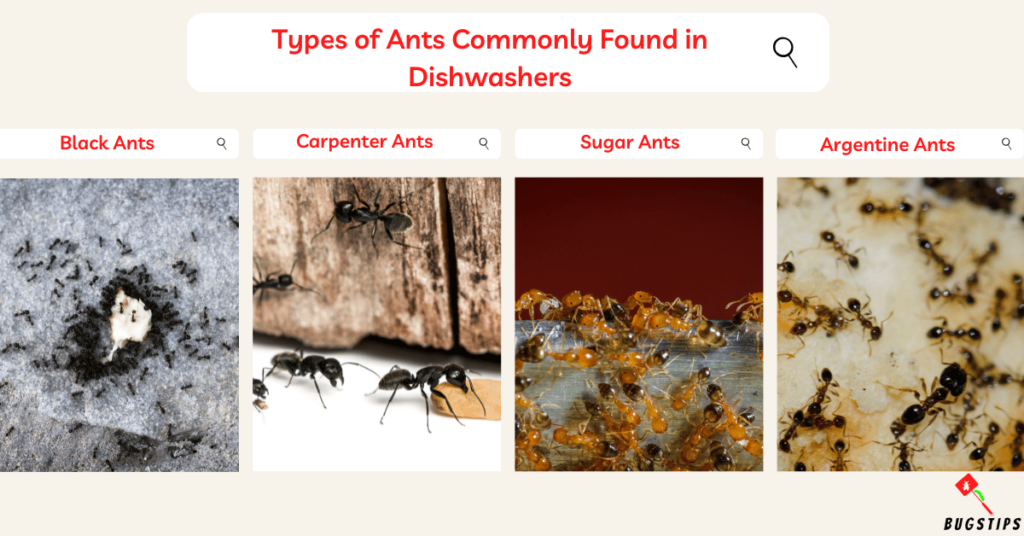
- Black Ants
- Black ants, also known as common house ants, are among the most prevalent ant species found in households.
- These ants are small, typically measuring around 2-3 mm in length.
- They are attracted to sugary substances and food residues, making your dishwasher an inviting location for them.
- Carpenter Ants
- Unlike black ants, carpenter ants are larger in size, ranging from 6 to 12 mm.
- They are known for their ability to damage wood, as they excavate galleries for nesting.
- While they are not typically drawn to dishwashers, if your kitchen has a moisture issue or nearby structural damage, carpenter ants may find their way into your dishwasher in search of food and water.
Related Article – What Attracts Carpenter Ants
- Sugar Ants (Pharaoh ants)
- Sugar ants, or Pharaoh ants, are small and light yellow in color.
- They are attracted to sweet substances and are known for their preference for sugary foods.
- If your dishwasher has residue from sweet liquids or spills, it can attract sugar ants to make their way inside.
- Argentine Ants
- Argentine ants are slender, light to dark brown ants that form large colonies.
- They are commonly found in kitchens and may infiltrate dishwashers searching for sources of food and water.
- Argentine ants are known for their ability to establish extensive trails, making it easier for them to locate and exploit food sources.
While the ant species we mentioned earlier are common invaders of dishwashers, it's important to note that other ant species can also find their way into your dishwasher if conditions are favorable. Ants are attracted to food residue and moisture, so any leftover food or spills in your dishwasher can attract a variety of ant species.
Can Ants Damage the Dishwasher?
Ants themselves typically do not cause direct damage to dishwashers. However, their presence can lead to certain issues that may indirectly impact the performance and functionality of your dishwasher.
- Contamination
- When ants enter your dishwasher, they can contaminate your dishes and utensils with their presence, feces, or any substances they carry.
- This can compromise the cleanliness and hygiene of your dishwasher and the items it washes.
- Food Residue
- Ants are attracted to food particles and residues left in your dishwasher.
- Their presence may indicate that there are food sources or spills that need to be addressed.
- Over time, the accumulation of food residues can clog filters, drain pipes, or spray arms in your dishwasher, affecting its efficiency.
- Electrical Components
- In rare cases, ants may cause damage to electrical components within the dishwasher.
- This is more likely to occur if ants build their nests in close proximity to wiring or if they chew on the insulation around electrical connections.
- However, such instances are uncommon.
Related Article – Dealing with Ants in Electrical Outlets
How to Prevent Ants from Entering the Dishwasher?
Preventing ants from entering your dishwasher requires a proactive approach to create an environment that is unappealing and inaccessible to these pesky insects.
Here are some effective measures to help prevent ants from infiltrating your dishwasher.

- Maintain Cleanliness
- Regularly clean your dishwasher, ensuring that it is free from food residues and spills that can attract ants.
- Wipe down the interior, remove any standing water, and check the filter for debris.
- Seal Entry Points
- Inspect your kitchen for potential entry points and seal them off.
- Look for gaps around pipes, wiring, or other openings near the dishwasher.
- Use caulk or sealant to close off these gaps and prevent ants from finding their way inside.
- Store Food Properly
- Ants are drawn to food sources, so store all food items in airtight containers.
- This includes dry goods, pet food, and even sugar containers.
- Keeping food properly sealed will minimize the scent of potential food sources and discourage ants from venturing into your kitchen.
- Remove Standing Water
- Check for any leaks or standing water near your dishwasher.
- Repair any plumbing issues promptly and ensure that there are no areas of moisture accumulation.
- Ants are attracted to water sources, so eliminating these can make your dishwasher less inviting.
- Natural Repellents
- Consider using natural ant repellents around your dishwasher area.
- For example, placing citrus peels, mint leaves, or cinnamon sticks near entry points can help deter ants due to their strong scent, which ants find unpleasant.
Related Article – How To Get Rid of Ants in Bedroom: 10 EASY Methods
Final Thoughts
Ants in the dishwasher can turn routine kitchen tasks into an annoyance. By understanding the factors that attract ants to your dishwasher and implementing effective strategies, you can eliminate these unwanted guests and prevent future infestations.
Remember to keep your dishwasher clean, seal entry points, and explore natural remedies or professional assistance if necessary. With these tips in mind, you’ll soon reclaim your dishwasher and enjoy a pest-free kitchen once again.
FAQs
Can ants live in the dishwasher?
While ants may explore the dishwasher seeking food and moisture, they generally do not establish long-term colonies or nests inside the dishwasher itself.
Why are there ants behind the dishwasher?
Ants may be present behind the dishwasher due to food debris, moisture, or gaps in the surrounding walls or flooring that provide access to the kitchen area. They often seek shelter and forage for food in such locations.
Can ants come up through the drain?
Yes, ants can enter your kitchen through drains. They can navigate through pipes and plumbing systems in search of food and water sources.
Can I run a dishwasher with ants in it?
It is not recommended to run a dishwasher with ants inside. Ants can potentially contaminate your dishes and compromise the cleanliness of your dishwasher.
How do ants get in a closed dishwasher?
Ants can find their way into closed dishwashers through gaps or openings in the surrounding cabinets, walls, or floor. They can also enter through tiny cracks around plumbing connections.
Will dishwashing liquid kill ants?
While dishwashing liquid can kill ants on contact, it may not be an effective long-term solution for eliminating ant infestations.
Can I spray Raid in my dishwasher?
It is not recommended to spray Raid or any other insecticide directly inside your dishwasher. Chemical residues from such products can pose health risks if they come into contact with your dishes or food.
Can I spray vinegar in my dishwasher?
Yes, you can use vinegar as a natural cleaning agent in your dishwasher. Vinegar can help remove stains, odors, and some residue.
Can I use borax for ants in the dishwasher?
Borax can be effective against ants as it disrupts their digestive system. However, using borax in the dishwasher is not recommended, as it can be corrosive to the dishwasher components and potentially contaminate your dishes.
Can I use bleach for ants in the dishwasher?
While bleach can kill ants, it is not an ideal solution for ant control in the dishwasher. Bleach is corrosive and can damage the dishwasher, and the residue may pose health risks.
Resources – (for further reading)
University of Kentucky – Ant Control for Householders | Entomology
The University of Tennessee System – Carpenter Ants: Those Big Ants in Your Kitchen
NC State Extension Publications – A Guide to House-Invading Ants and Their Control

